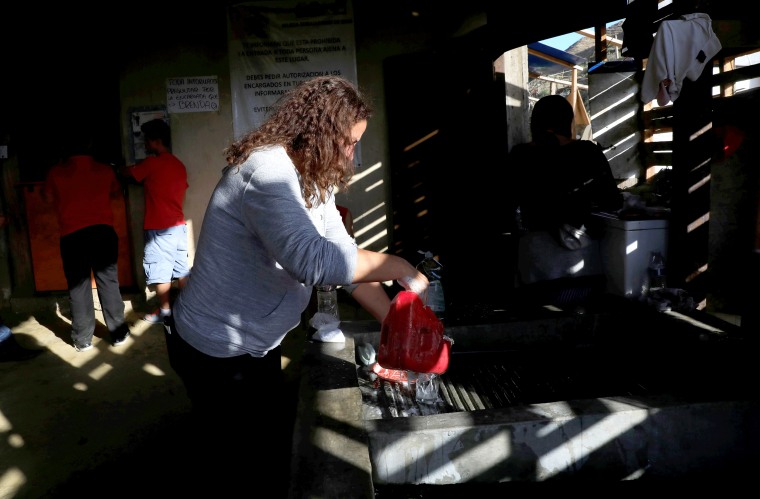Carlos Marcano says members of Venezuela’s intelligence agency kidnapped and beat him last year after he organized and marched in a political protest.
“I thought they would kill me,” Marcano, 42, told NBC News.
He tried to report his persecution, but the situation only got more dire when his attackers found out. So he fled Venezuela and traveled to the U.S.-Mexico border, where he waited in line to apply for asylum in the United States.
Marcano is part of a larger swell of Venezuelans, Nicaraguans and Cubans who are relying on the U.S. immigration court system as a lifeline. Between September 2018 and December 2019, they became the fastest growing nationalities caught up in the courts’ million-case backlog, according to Syracuse University’s Transactional Records Access Clearinghouse. The number of Cubans with pending cases more than quadrupled, and cases involving Venezuelans and Nicaraguans also surged.
Close to 4.8 million Venezuelan migrants and refugees have left their country, according to the coordination platform Response for Venezuelans. Christopher Sabatini, a senior research fellow for Latin America at Chatham House in London, described Venezuela as a failed state with an economy in free fall and a lack of jobs, medicine or food.
“It is a full-out humanitarian crisis, the likes of which the world has never seen without an all-out war,” he said.
Meanwhile, Nicaraguans are fleeing their homes after anti-government protests in 2018 were violently crushed by national police and pro-government groups, resulting in hundreds of deaths and thousands of injuries. Human Rights Watch has reported that protesters there were raped, electric-shocked, waterboarded and beaten by authorities.
In Cuba, residents are dealing with an economic slowdown and ongoing issues with political repression amid the increasingly hard-line U.S. policies under the Trump administration. In fiscal year 2019, Cubans submitted more than 18,000 credible fear claims, a first step toward asylum in the U.S.
For asylum-seekers from these three countries, "the push factors aren’t going away,” said Jessica Bolter, an associate policy analyst with the Migration Policy Institute (MPI). “So there’s a question of whether or not they will outweigh the deterrent measures that the U.S. government has put into effect.”
The U.S. embassies in Caracas and Havana have suspended all or almost all visa processing in both countries, and Bolter believes Cubans and Venezuelans’ virtual inability to obtain proper U.S. travel documentation at home has funneled even more traffic to the U.S.-Mexico border.
Asylum-seekers who make it to Mexico are then confronted by hard-line U.S. immigration policies such as the Migrant Protection Protocols and “metering,” both of which strand people in dangerous border cities for a time before they can request asylum stateside.
If migrants at the border do actually have the opportunity to start the asylum process, they’re at the mercy of immigration courts that are housed in the Department of Justice — under the same government branch that’s trying to keep them out. The immigration court system has faced scrutiny over due process concerns, as well as problems with efficiency and effectiveness, and its own judges have called for increased judicial independence and reform.
Asylum cases not "going forward" as they should
With the courts’ teeming backlog, some migrants who are detained or fast-tracked by the administration are being rushed through their hearings before they find a lawyer, Gracie Willis, a staff attorney with the Southern Poverty Law Center, said. Others are getting assigned court dates that are years away, and as they wait, their evidence gets stale or witnesses go missing.
“Sometimes, things are too fast, and sometimes they’re too slow, but what’s not happening is that cases are going forward when they’re ripe,” Willis said.
Though Marcano set out for the U.S. in February 2019, his asylum hearing isn’t until April 2022. To earn his day in court, he stayed for about two months in Tijuana, Mexico, one of the world’s most dangerous cities, before being detained in the U.S. for even longer during what he described as the most difficult time of his life.
Marcano has since been released and reunited with his family in Dallas ahead of his hearing. But he said he couldn’t understand why he had been detained because he didn’t feel he had done anything wrong to deserve confinement.
“The whole story of Venezuelan immigration is a sad story, you know?” he said. “No one leaves their country, a country that we love so much, just on a whim.”
Follow NBC Latino on Facebook, Twitter and Instagram.


